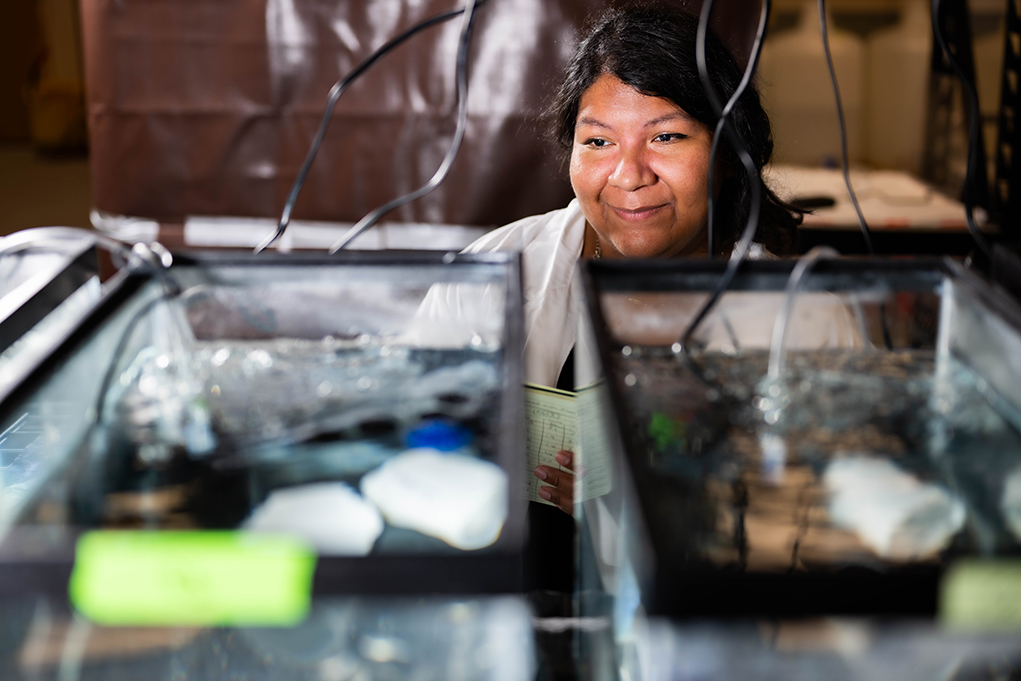When Celeste Ortega-Rodriguez (’15) decided to pursue her bachelor’s degree in biological sciences at UNT, graduate school was the furthest thing from her mind.
A first-generation college student raised by her mother in Sherman, Texas, Ortega-Rodriguez funded her undergraduate studies through a combination of scholarships, federal aid and UNT’s Emerald Eagle Scholars Program, which provides four years of tuition to academically talented students with high financial need.
“Coming to UNT was life-changing for me,” she says. “UNT gave me the opportunity to get an education, because otherwise it wouldn’t have been on the table.”
Now a second-year Ph.D. student in biological sciences and a member of UNT’s Graduate Research Training Initiative for Student Enhancement (G-RISE) program, Ortega-Rodriguez has been given the support system to soar even
farther in her field.
G-RISE is a program funded by the U.S. National Institutes of Health to cultivate scientists from all backgrounds who have the skills to thrive in the biomedical research workforce. As one of only 22 Tier One research universities in the nation designated a Hispanic-Serving Institution by the U.S. Department of Education, UNT is committed to preparing the next generation of scientists, scholars and innovators who have the skills and experience they need to launch careers in a competitive market in Texas and beyond. Since it debuted at UNT in 2021, the G-RISE program has supported 16 doctoral students across STEM disciplines including three who have completed their degrees.
Trevor Exley (’20, ’21 M.S., ’24 Ph.D.), who earned one of UNT’s first doctorates in biomedical engineering, left UNT with much more than a degree. As a member of Amir Jafari’s Advanced Robotic Manipulators Lab in the College of Engineering, he contributed to patent-pending inventions that could change physical human-robot interactions in the future. He credits the support from G-RISE as being “fundamental” for him being able to focus on the research, which is laying the foundation for him to one day lead a lab of his own.
“By providing critical financial support, mentorship, professional development and opportunities for cross-disciplinary collaboration, the G-RISE program at UNT increases accessibility and enriches the research experience for our graduate students conducting biomedically relevant research,” says Pamela Padilla, vice president for research and innovation.
Finding Support
Ortega-Rodriguez discovered her passion for research while completing her Honors College undergraduate thesis with her advisor, Mark Burleson, senior lecturer of biological sciences. She also served as a research volunteer in the ecotoxicology lab led by Aaron Roberts, associate vice president for research and innovation and professor of biological sciences.
“My undergraduate research experiences revealed a whole new world for me,” Ortega-Rodriguez says. “As neither of my parents graduated from college, and no one in my extended family had ever earned a graduate degree, I was unaware of science-related careers outside of health care. Aaron was the first person to encourage me to continue my journey with graduate school.”
After earning her master’s degree at Texas Christian University, she reconnected with Roberts and shared her dream — and her reservations — of continuing her education.
“Aside from the application and tuition, there can be so many unwritten costs of graduate school, such as moving, housing, being able to afford health care on your own. I was really worried about how successful I would be knowing that I would have these outside financial stressors that could impact my work,” she says.
Roberts introduced her to G-RISE, so she applied and eventually got accepted into the program at UNT. Now, she’s back working alongside Roberts in his environmental toxicology research lab.
"Programs like G-RISE give students like me the opportunity to belong and to be successful by breaking down those barriers, whether it’s financial stress or a lack of confidence or a lack of mentorship. And then, of course, by giving us that community.”
-Celeste Ortega-Rodriguez, doctoral student in biological sciences
“Grad school can be really challenging for first-generation students,” Ortega-Rodriguez says. Programs like G-RISE give students like me the opportunity to belong and to be successful by breaking down those barriers, whether it’s financial stress or a lack of confidence or a lack of mentorship. And then, of course, by giving us that community.”
In Roberts’ lab, Ortega-Rodriguez studies the generational effects of pollutants on fish — specifically the neurobiology and behavior that environmental contaminants can have in offspring who weren’t exposed to the chemical, but whose parents were.
“We use fish as a research model, but our work has broader implications for how we might understand chemical exposure in humans,” she says.
The work is deeply personal to Ortega-Rodriguez, whose grandparents were farm workers who traveled across the U.S. with their children doing hard, manual labor for long hours. Her mother began working in the fields at 5 years old, carrying water to workers, digging up potatoes, picking cotton and other crops. She once told Ortega-Rodriguez about how the workers would get so thirsty they would drink water directly from the irrigation spouts. This was in the 1960s, when research was just coming out about the harmful effects of pesticides and herbicides being sprayed on crops.
“When I think about the kind of work that I want to do in environmental policy, I want part of it to be advocating for underserved populations who may be susceptible to environmental contamination — whether it’s due to language barriers, minimal education, low socioeconomic status or a lack of community support,” Ortega-Rodriguez says.
Read more about G-RISE at UNT Research & Innovation